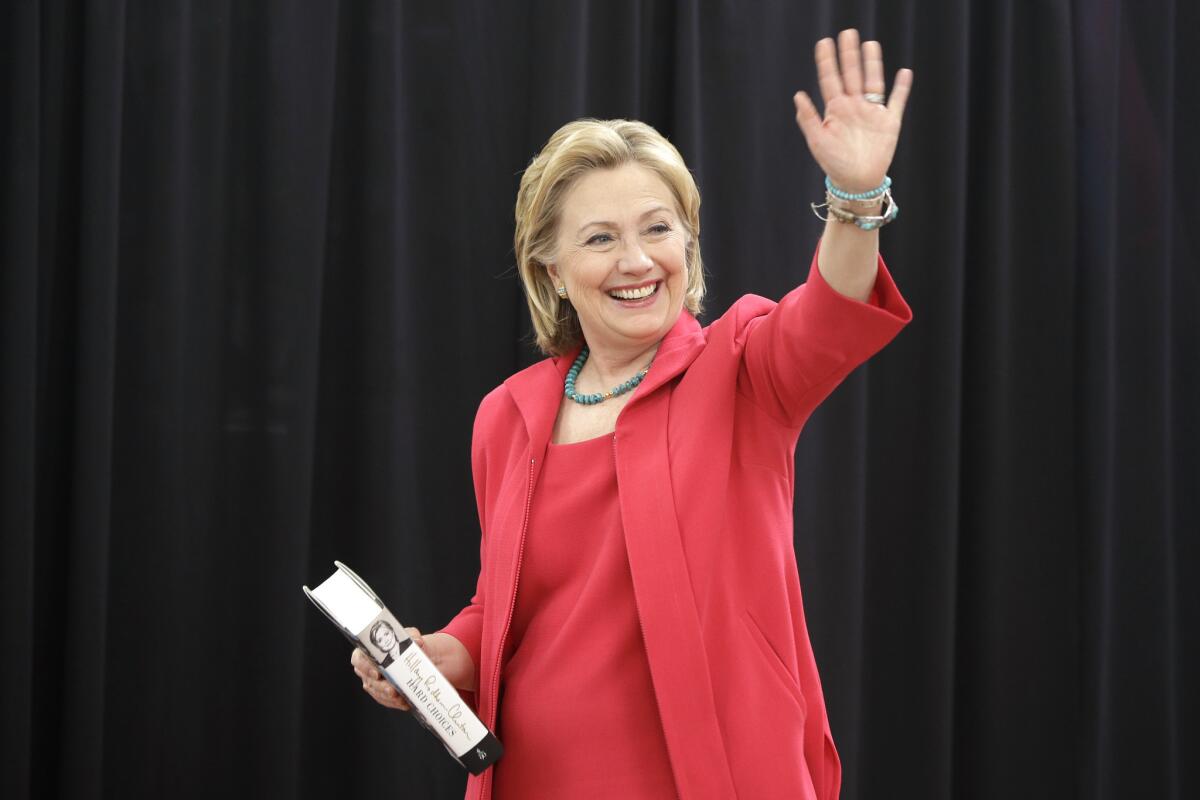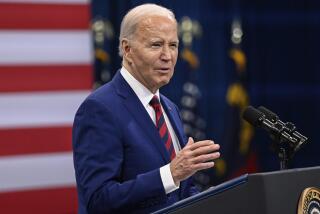Without even running, Hillary Clinton achieves an Iowa victory

Hillary Rodham Clinton has yet to announce her intentions regarding 2016, much less whether she would compete in Iowa, which traditionally votes first in the presidential campaign. But she can already claim a victory of sorts, as Iowa Democrats weigh changes in their balloting to address concerns Clinton raised in losing the state in 2008.
Spurred in part by pressure from the party’s national leadership — which includes a number of Clinton allies — the Iowa party is considering ways to expand participation in its caucuses, which have been structured in ways that prevent many voters from taking part.
Possible changes include the use of absentee ballots and online voting, allowing those physically absent to participate in the caucuses, which typically occur on a cold winter night and last for hours.
“As Democrats, we’re always looking for ways to expand the electorate,” Scott Brennan, chairman of the Iowa Democratic Party, said in an interview Tuesday. He described the review as the sort of evaluation that takes place after every election cycle, asking, “Is there something else we can do to make [the caucuses] better?”
But others believe the effort is driven in significant part by supporters of Clinton, who want to coax her into the 2016 race and ensure a better Iowa performance than in 2008, when she finished an embarrassing third, behind Barack Obama and John Edwards. Clinton, once the prohibitive front-runner for the Democratic nomination, never fully recovered from her Iowa setback.
David Nagle, a former Iowa congressman and state Democratic chairman, suggested Clinton and her supporters were still bitter over that loss and “want to get her in the ideal position” to run again.
“I have not heard that from anybody,” responded Don Fowler, an ardent Clinton supporter from South Carolina and a longstanding member of the Democratic Party’s rule-making committee. “Not to say some people don’t think that.”
Voting in the caucuses is different than casting a ballot in a primary election, in which polling places are typically open from the early-morning hours until at least the early evening.
Consisting of more than 1,700 precinct-level meetings across Iowa, the caucuses start in the early evening and begin with a number of organizational and party housekeeping measures that can take considerable time to resolve.
Only then do participants get to vote for their presidential preference, which they do openly, often amid spirited discussion. Success requires not only organizational skill on the part of a campaign but a great deal of patience on the part of a candidate’s supporters and — not least — their ability to show up and remain throughout the evening.
Even before her 2008 defeat, Clinton and her political allies were critical of the caucuses, saying the restricted hours and long duration prevented many of her backers — especially blue-collar workers — from participating. At one point, her campaign considered avoiding Iowa entirely.
“You know, there were a lot of people who couldn’t caucus tonight, despite the large turnout,” Clinton said in her concession speech. “They are in Iraq or Afghanistan or somewhere else serving our country.”
She went on: “There are a lot of people who work at night, people who are on their feet, people who are taking care of patients in a hospital, or waiting on a table in a restaurant, or maybe in a patrol car keeping our streets safe.”
Iowa’s political leaders have long been sensitive to outside criticism of the caucuses, which shower the state with extraordinary attention from presidential candidates and the media that cover them. Any challenge to its first-in-the-nation franchise is treated with the utmost concern. (By agreement, Iowa holds the first caucuses and New Hampshire holds the first primary, usually a little over week later.)
In a move led by Republican Gov. Terry Branstad, the Iowa GOP recently reconstituted its state party leadership to put the establishment in charge and encourage the broadest possible field of Republican presidential candidates.
For their part, Iowa Democrats have undertaken what Brennan called “a listening tour” to gather thoughts on proposed reforms, such as proxy votes and a way to allow members of the military to participate from afar. Recommendations are due to be presented to national party leaders at a rules committee meeting in Washington starting Aug. 1.
Some, like Nagle, are dubious of changes, seeing no good reason. Spurred by the fierce 2008 presidential competition, a record 240,000 Democrats turned out on that Jan. 3 evening.
“People forget the principal purpose of the caucuses is to build the party, and that’s worked just fine,” said Nagle, who has been involved in the caucuses from their beginning in the early 1970s. “They’re a source of financing, a source of recruiting volunteers, recruiting candidates, building party structure. The presidential preference ballot, which the national media seized upon, is just a byproduct.”
In fact, the precinct-level caucuses are the first step in a prolonged process that ends with Iowa awarding its national convention delegates several months later, long after most of the national media has stopped paying attention.
Mindful of the Democrats’ deliberations, Iowa GOP leaders recently expressed skepticism about the use of absentee ballots in their caucuses, which are run separately. Part of the reason was concern that anything akin to a “mini-primary” might antagonize New Hampshire officials and jeopardize the alliance that has kept the states No. 1 and No. 2 in presidential balloting for several decades.
Brennan is aware of those sensitivities. “We keep in mind that we need to make sure it does not look like a primary,” he said of possible changes on the Democratic side. “We host the first caucus. [New Hampshire] hosts the first primary.”
Follow @markzbarabak for more on national & California politics
More to Read
Start your day right
Sign up for Essential California for news, features and recommendations from the L.A. Times and beyond in your inbox six days a week.
You may occasionally receive promotional content from the Los Angeles Times.







